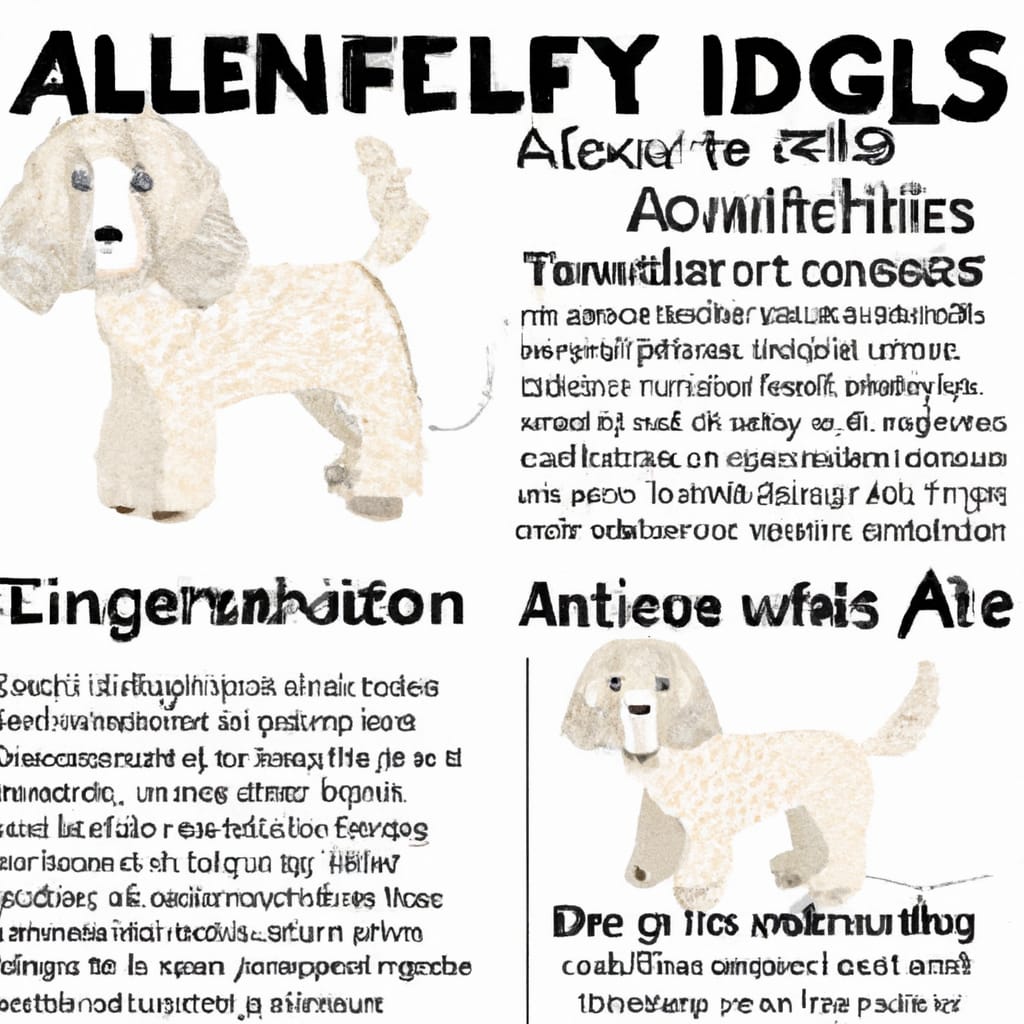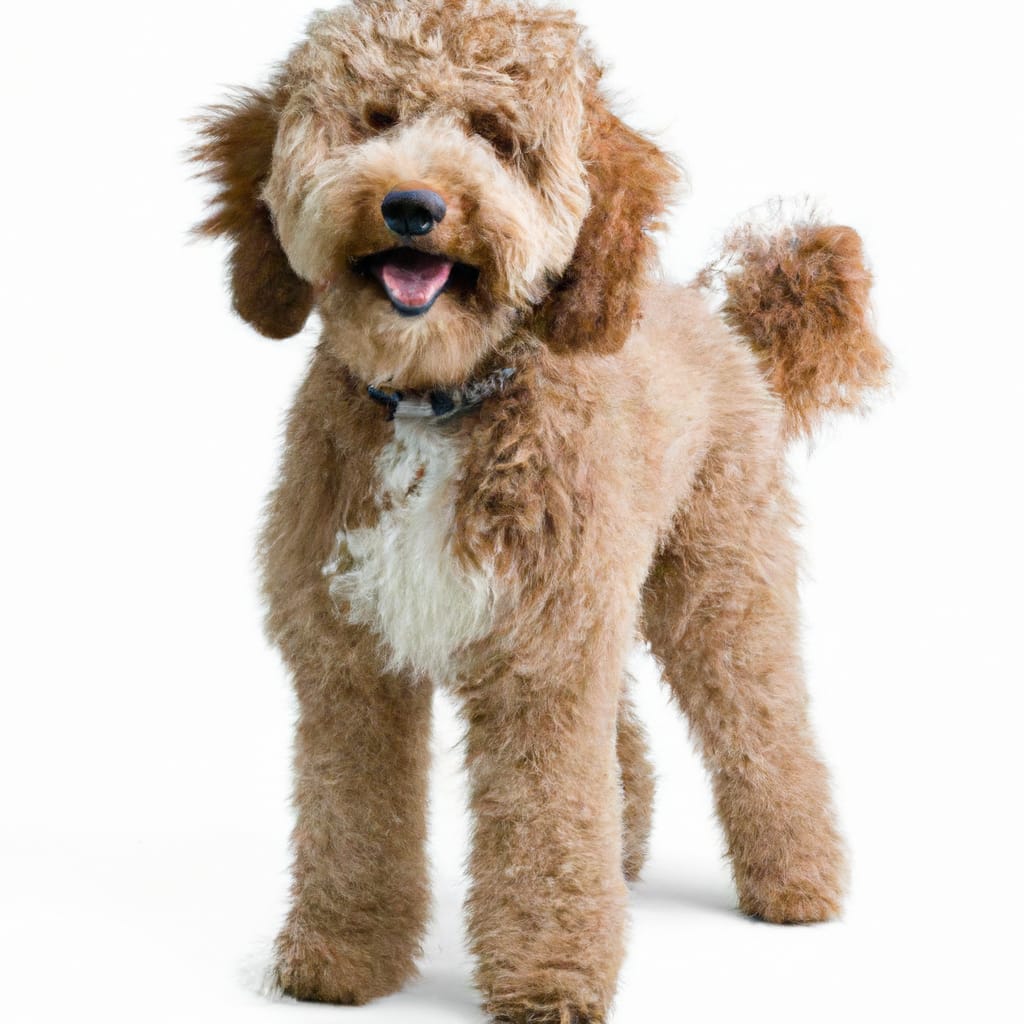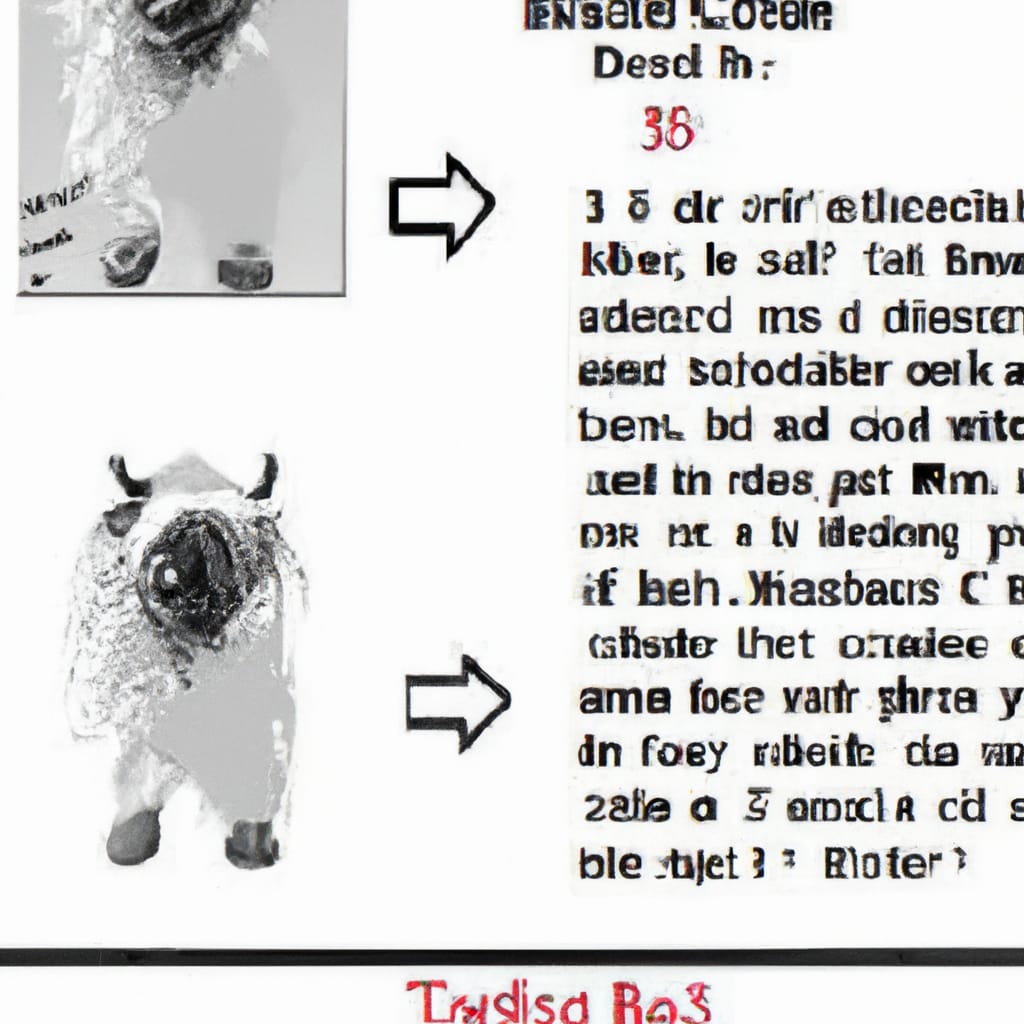Allergen Hypoallergenic? Understanding Doodle Dog Allergies
Have you ever wondered if doodle dogs are truly hypoallergenic? If you or a loved one suffer from allergies but long for a furry friend, this article will provide you with a deeper understanding of doodle dog allergies. We’ll explore the difference between hypoallergenic and allergen, debunk common misconceptions, and provide tips on managing allergies for those who are set on welcoming a doodle dog into their homes. Say goodbye to sneezes and watery eyes, and say hello to cuddles and tail wags!
What are Doodle Dogs?
Doodle Dogs, also known as designer dogs, are a crossbreed between a Poodle and another breed. They have gained popularity in recent years due to their unique characteristics and hypoallergenic claims. Their name “Doodle” comes from the combination of “Poodle” and the other breed they are crossed with. These dogs often have a curly or wavy coat, making them look adorable and fluffy.
Breeds that are considered Doodle Dogs
There are various breeds that are considered Doodle Dogs, depending on the combination of Poodle and the other breed. Some popular Doodle breeds include Labradoodles (Labrador Retriever and Poodle mix), Goldendoodles (Golden Retriever and Poodle mix), and Bernedoodles (Bernese Mountain Dog and Poodle mix). Each breed has its own unique characteristics and appearance, but they all share the common feature of being a Doodle Dog.
Characteristics of Doodle Dogs
Doodle Dogs are known for their friendly and sociable nature. They are often highly intelligent and trainable, inheriting these traits from their Poodle parent. Additionally, Doodle Dogs are typically low-shedding and have a hypoallergenic coat, which is one of the reasons why they are popular among people with allergies. They come in various sizes, ranging from small to large, depending on the Poodle breed used in the crossbreeding.
Allergen Misconceptions
Defining hypoallergenic
When it comes to Doodle Dogs, the term “hypoallergenic” is often used to describe them. However, it’s important to understand what this term really means. “Hypoallergenic” refers to a reduced ability to cause an allergic reaction, as compared to other breeds. It does not mean that a dog is completely allergen-free or will not cause any allergies at all.
The myth of hypoallergenic dogs
Many people mistakenly believe that hypoallergenic dogs are completely safe for individuals with allergies. However, this is a common misconception. Allergies are caused by allergens, which are substances that trigger an immune response in sensitive individuals. While some breeds may produce fewer allergens or have less dander, there is no dog breed that is completely hypoallergenic.
Doodle Dogs and hypoallergenic claims
Doodle Dogs are often marketed as hypoallergenic due to their low-shedding coats and the belief that they produce fewer allergens. However, it is important to note that the allergenicity of a dog is not solely determined by their coat type. Other factors, such as saliva and urine allergens, also contribute to the overall allergenic potential of a dog. Therefore, while Doodle Dogs may be a good choice for individuals with allergies, it is important to manage expectations and understand that individual reactions may vary.

Understanding Dog Allergies
Common allergens found in dogs
Dog allergens can be found in various sources, including their skin, saliva, urine, and dander (tiny flakes of dead skin). These allergens can become airborne and cause allergic reactions in sensitive individuals. Proteins found in a dog’s skin and saliva, such as Can f 1 and Can f 2, are often the primary allergens responsible for triggering allergies.
Symptoms of dog allergies
Symptoms of dog allergies can vary from mild to severe and may include sneezing, runny nose, itchy eyes, coughing, wheezing, skin rashes, and shortness of breath. These symptoms can be similar to those of other allergies, making it important to consult with a healthcare professional to determine if dog allergies are the cause.
Testing for dog allergies
If you suspect that you or someone in your household has a dog allergy, it is recommended to see an allergist for testing. Allergy testing can help identify specific allergens and determine if dog allergens are the trigger. Skin prick tests and blood tests, such as IgE antibody tests, are commonly used to diagnose dog allergies.
Doodle Dog Allergies
Are Doodle Dogs really hypoallergenic?
While Doodle Dogs are often considered hypoallergenic, it is important to understand that the degree of allergenicity can vary from individual to individual. Some people with allergies may tolerate Doodle Dogs well, while others may still experience allergic reactions. It is essential to spend time with a Doodle Dog before committing to ensure that there is no severe allergic reaction.
Factors affecting Doodle Dog allergies
Several factors can influence the allergenicity of Doodle Dogs. These include the specific breed of Poodle used in the crossbreeding, individual variations in allergenicity, and the presence of other allergens in the dog’s environment. Each Doodle Dog may have a different mix of genes and allergenic potential, making it important to consider individual factors when choosing a Doodle Dog.
Individual variations in allergenicity
Each person may have a different level of sensitivity to dog allergens, which can contribute to individual variations in allergenicity. Some individuals may be more sensitive to certain allergens found in Doodle Dogs, while others may have a higher tolerance. It is crucial to consult with an allergist and spend time with the breed before bringing a Doodle Dog into your home.

Hypoallergenic Breeds vs Individual Tolerance
Hypoallergenic breeds and limited allergens
Certain dog breeds are often considered more hypoallergenic than others due to their low-shedding coats and reduced production of allergens. Breeds such as Poodles, Bichon Frises, and Maltese are often recommended for individuals with allergies. However, it is important to note that even hypoallergenic breeds can still cause allergies in some sensitive individuals.
Individual tolerance to allergens
Individual tolerance to allergens varies from person to person. Some individuals may be able to tolerate a certain breed or dog, while others may experience severe allergic reactions. It is vital to consider individual tolerance when choosing a dog, regardless of whether it is a hypoallergenic breed or a Doodle Dog.
How Doodle Dogs fit into the picture
Doodle Dogs, with their low-shedding coats and potential for reduced allergenicity, can be a suitable choice for individuals with allergies. However, it is important to remember that not all Doodle Dogs will be hypoallergenic, and individual reactions may still occur. Spending time with a Doodle Dog and consulting with an allergist can help determine if a Doodle Dog is a suitable option for your specific allergies.
Factors Influencing Allergenicity
Dog coat and dander production
The type of coat a dog has can influence its allergenic potential. Doodle Dogs with wool-like or curly coats are often considered more hypoallergenic because their coats trap dander and prevent it from becoming airborne. However, it is important to note that no dog breed is completely dander-free, and individual reactions can still occur.
Saliva and urine allergens
In addition to dander, dog saliva and urine contain allergenic proteins that can trigger allergies in sensitive individuals. When a dog licks its fur or urinates, these allergens can come into contact with the environment, leading to potential allergic reactions. Regular grooming and cleaning of the dog’s living area can help reduce the presence of allergens.
Other factors affecting allergenicity
Other factors that can influence the allergenicity of Doodle Dogs include the individual dog’s overall health, diet, and the presence of other allergens in the environment. A healthy, well-groomed Doodle Dog may produce less allergens compared to a dog with poor health or inadequate grooming. Additionally, the presence of other allergens, such as pollen or dust mites, can exacerbate allergic reactions in sensitive individuals.
Reducing Allergens in the Home
Regular grooming and bathing
Regular grooming and bathing are essential for reducing allergens in the home. Brushing a Doodle Dog regularly helps remove loose hair and dander, preventing them from becoming airborne. Bathing the dog with hypoallergenic shampoos can also help remove allergens from their coat. It is important to follow a grooming routine recommended by a professional groomer to keep allergen levels low.
Allergen-free environments
Creating an allergen-free environment can help minimize allergic reactions. This includes keeping the living area clean and free from dust and other allergens, using allergen-proof bedding and furniture covers, and implementing a strict no-dog on the bed policy. Regular vacuuming and using HEPA filters can also help remove allergens from the air.
HEPA filters and air purifiers
Using HEPA filters and air purifiers can significantly reduce allergens in the home. HEPA filters are designed to capture microscopic particles, including pet dander, pollen, and dust mites. By using a HEPA filter in the home, the concentration of allergens in the air can be reduced, providing relief for individuals with allergies.
Tips for Allergy Sufferers
Spend time with the breed before committing
Before committing to a Doodle Dog or any other breed, it is crucial to spend time with them to determine if you have any allergic reactions. This can involve visiting a friend or family member who has a Doodle Dog or spending time with one at a local shelter or breeder. By observing your reactions, you can better assess whether a Doodle Dog is a good fit for your allergies.
Consult with an allergist
If you have a known allergy or suspect that you may be allergic to dogs, it is important to consult with an allergist. An allergist can conduct tests to determine the specific allergens that trigger your allergies and provide guidance on managing your allergies while living with a Doodle Dog or other dog breeds.
Consider low-shedding breeds
If you are specifically looking for a hypoallergenic dog, consider low-shedding breeds like Doodle Dogs. While individual reactions may still occur, these breeds often produce less dander and shed less hair, reducing the overall allergenic potential. However, it is important to note that hypoallergenic does not mean allergen-free, and individual tolerance should always be considered.
Managing Doodle Dog Allergies
Medications for managing allergies
For individuals with allergies, there are various over-the-counter and prescription medications available to manage symptoms. Antihistamines, nasal sprays, and eye drops can help alleviate allergy symptoms when exposed to dog allergens. It is important to consult with a healthcare professional to determine the most suitable medication for your specific allergies.
Allergy shots and immunotherapy
For individuals with severe allergies, allergy shots or immunotherapy may be recommended. These shots, given over a period of time, help desensitize the immune system to specific allergens, reducing the severity of allergic reactions. Allergy shots can be customized based on specific allergens, including dog allergens, for more targeted relief.
Lifestyle adjustments for allergy management
In addition to medications and immunotherapy, making lifestyle adjustments can help manage Doodle Dog allergies. This can include keeping the dog out of bedrooms or off furniture, creating dog-free zones in the home, and implementing thorough cleaning routines to reduce allergen exposure. Regularly washing bedding and using high-efficiency air filters can also play a significant role in managing allergies.
Conclusion
Doodle Dogs are popular for their adorable appearance and potential as hypoallergenic pets. While they may have lower allergenicity compared to some other breeds, it is important to understand that there is no completely hypoallergenic dog. The allergenic potential of Doodle Dogs can vary from individual to individual, and it is crucial to spend time with the breed and consult with an allergist before making a decision. By understanding dog allergies, managing allergens in the home, and considering individual tolerance, individuals with allergies can take steps towards enjoying the companionship of a Doodle Dog while minimizing allergic reactions.













